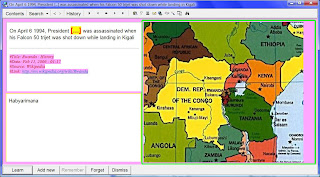Momentary mental impression BECOMES short-term memory BECOMES stable short-term memory BECOMES (over time) long-term memory.
For the sake of outlining the argument, here is the rough life-span of each memory "species":
Momentary impressions: a few seconds
Short-term: a few minutes
Stable short-term: a few hours/a few days
Long-term: many weeks, months, years, etc.
Momentary to Short-Term
 Daily we have many mental impressions, not all of them being valuable and worth "capturing." But ANYTHING we wish to remember starts out as a momentary impression on the mind; whether or not it goes any further is up to the individual. When you are introduced to a cute member of the opposite sex, you mentally treat their name different than someone you are not really concerned with. Rather than quickly discarding it, you think about the name and link it with that person. Because you desire to know more about that person, you concentrate and put forth effort to remember their name. Thus, a momentary mental impression has now become a short-term memory.
Daily we have many mental impressions, not all of them being valuable and worth "capturing." But ANYTHING we wish to remember starts out as a momentary impression on the mind; whether or not it goes any further is up to the individual. When you are introduced to a cute member of the opposite sex, you mentally treat their name different than someone you are not really concerned with. Rather than quickly discarding it, you think about the name and link it with that person. Because you desire to know more about that person, you concentrate and put forth effort to remember their name. Thus, a momentary mental impression has now become a short-term memory.Short-Term to Stable Short-Term
Short-term memories become more stable as you review them over a few hours. Often you can tell if a memory has gone from "short-term" to "stable short-term" by the end of the day. If you have tried learning a second language, you have no doubt found that certain words or phrases you tried to learn during a study session stuck while others did not. I believe this is because if a short-term memory does not become "stable," it quickly falls the way of the "momentary mental impression" route and perishes with the other static we dismiss during the day.
Stable Short-Term to Long-Term
This transformation is what SuperMemo, Anki, etc. adequately take care of.
My question is this: Just as there is an algorithm to ensure long-term stability of memories, is there also an algorithm that turns a short-term memory into a stable one? If you could do this efficiently and easily, learning languages (Among many other things) would become easier and more motivating. I think I know what might aid us in finding this out: Pimsleur.
Having recently finished Pimsleur Hindi (Comprehensive), I noticed something: while I do have a couple of complaints about the selection of vocabulary that was taught, I was surprised at how easily the taught vocabulary and phrases were memorized. Regardless of how difficult ANYTHING sounded when I initially heard the opening conversation, the Pimsleur audio course ensured that my short-term impression of any word or phrase became a stable short-term impression. As I went over each lesson, I put the new phrases into SuperMemo and have had no problems recalling them since.
I began to think about this while driving to and from work for a few days: It isn't an accident that this happened. At the Pimsleur language company there is not a person working there that speaks dozens of languages and uses his mysterious ways to teach you a language. At Pimsleur they don't care what language they are teaching you; they have an algorithm, and when they want to teach a new language they simply plug something different into the same algorithm.
Granted, they have to make a good selection of material (Which can vary from language to language), but once the material is selected, it's just a matter of listening to the lessons as you go about your day. This process seemed mysterious to me at first, but like anything else, Pimsleur's language teaching process must have a solid, scientific basis. Once that basis is figured out, you can use it for other things.
In an attempt to figure out their process, I've made a transcript of Pimsleur Japanese lesson 1, and I created a time stamp each time a new phrase or word is introduced, and each time the student is quizzed over something. The transcript is in the previous post. The time stamps stand for when the speaker concludes his statement, be it a quiz or an introduction to a new phrase or vocabulary word. Also, because many of the words you learn in the lessons are later used in phrases, there is some degree of overlap which I tried to keep straight.
I think that using this transcript, we can figure out the algorithm the Pimsleur company uses to make information "sticky" and memorable. Please give me suggestions, or fool around with this data yourself; if this yields positive results, it has the potential to be very useful to us language learners!





